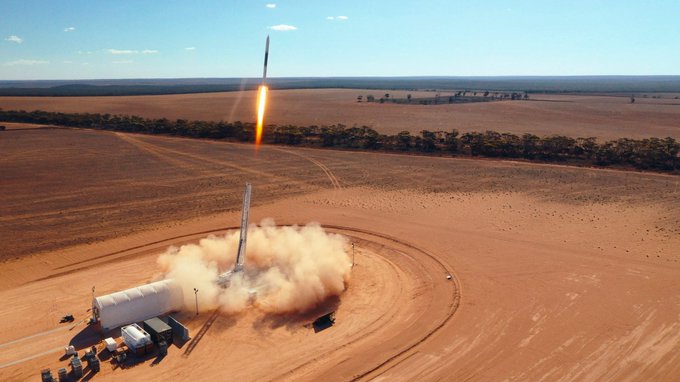Hyimpulse Successfully Launches Germany's first Commercially Viable Launch Vehicle
Koonibba, Australia, May 3, 2024--For the first time, a German company has successfully launched a commercially viable launch vehicle. At the Australian launch site in Koonibba, HyImpulse, a German manufacturer and system provider of commercial launch vehicles for satellite transport, successfully test-launched the 12-metre-long and 2.5-tonne single-stage rocket "SR75", which can transport small satellites weighing up to 250 kg to an altitude of around 250 km. At 14:40 PM ACST or 7:10 AM CET, the launch vehicle lifted off successfully and the hybrid rocket propulsion system of the launch vehicle operated as planned. After the successful lift-off, the SR75 will be retrieved for further examination and analysis of the data.
 |
| Hyimpulse's SR75 hybrid rocket successfully lifting off from the launch site in Koonibba, Australia. (photo courtesy of Hyimpulse). |
HyImpulse introduces a groundbreaking propulsion concept with its rockets, utilizing solid paraffin (commonly known as candle wax) and liquid oxygen as fuel. Paraffin, being both costeffective and inherently safe as a fuel, serves as an alternative to conventional liquid or solid fuels and does not have the risk to explode. This innovative design significantly simplifies the construction of launch vehicles, cutting costs by a remarkable 40 percent compared to traditional propulsion systems. As a result, satellite transportation expenses are reduced by an impressive 50 percent, demonstrating HyImpulse's commitment to affordable access to space.
Dr. Mario Kobald, co-founder and co-CEO of HyImpulse: " Setting up a commercial launch vehicle equipped with entirely new propulsion technology up for launch and lift-off with such an efficient team and a relatively small budget is quite a feat. We're signaling Germany's prowess as a spacefaring nation and expanding Europe's access to space. Already, we're planning the launch of a larger, multi-stage transport launch vehicle capable of deploying satellites weighing up to 600 kilograms into low Earth orbits by the end of next year."
Dr. Christian Schmierer, co-founder and co-CEO of HyImpulse: "With this successful launch, which also provides us with valuable data for further development, we have validated our technical concept and demonstrated our market readiness. Our utilization concept is designed for the cost-effective transport of small satellites into space. This enables the implementation of privately funded environmental and climate projects, research projects, as well as navigation, telecommunications, and more. The demand for commercial launch vehicles for the transportation of satellites in Europe is substantial. Accordingly, with a volume well exceeding 100 million Euro, our order book is already substantial and continues to grow monthly."
The SL1 multi-stage orbital launch vehicle, scheduled for its inaugural lift-off by the end of 2025, stands at a height of 32 meters and weighs 50 tons. Depending on the weight of the payload, it can ascend to an altitude exceeding 500 km, i.e. reaching low Earth orbits. Designed for costeffective transportation of small satellites into space, it can carry payloads of up to 600 kilograms to low Earth orbits.
Related Article:





